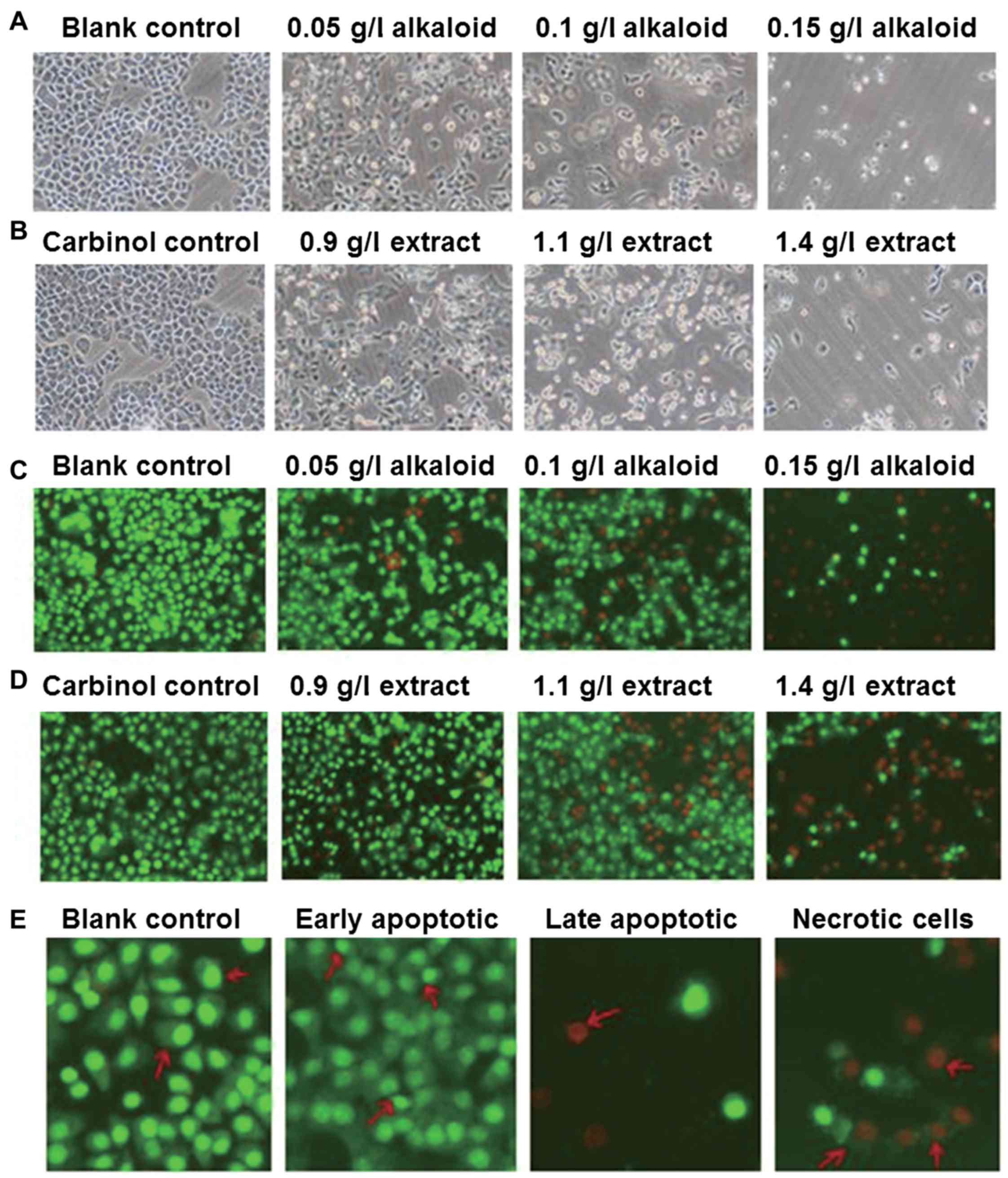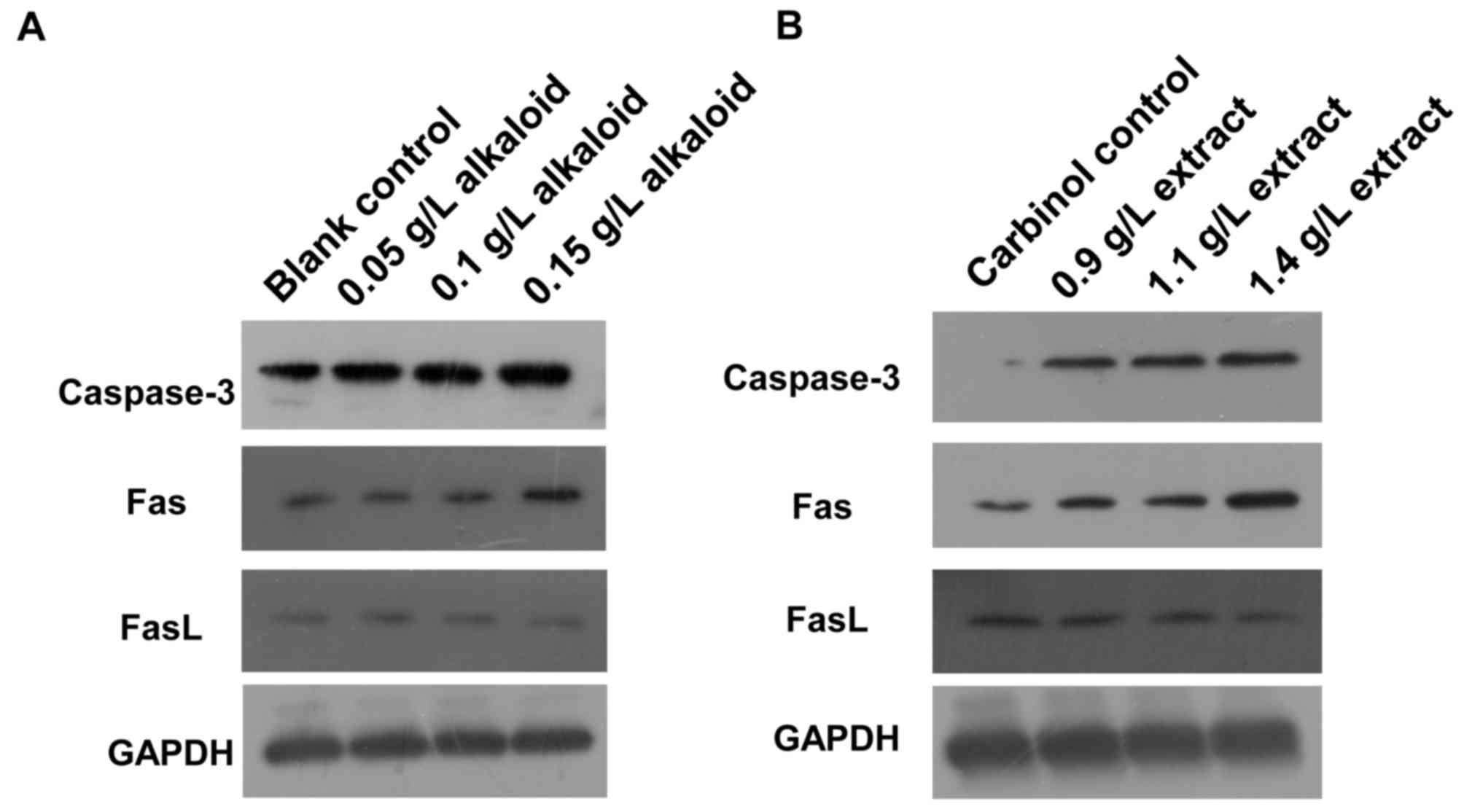|
1
|
Liu X, Chen Z, Zhao X, Huang M, Wang C,
Peng W, Yin J, Li J, He G, Li X and Zhu X: Effects of IGF2BP2,
KCNQ1 and GCKR polymorphisms on clinical outcome in metastatic
gastric cancer treated with EOF regimen. Pharmacogenomics.
16:959–970. 2015. View Article : Google Scholar : PubMed/NCBI
|
|
2
|
Zhang M, Ren T and Xiao Z: Clinical
observation of paclitaxel combined with oxaliplatin in the
treatment of advanced gastric cancer. Chin J Coal Industry Med.
11:891–892. 2008.(In Chinese).
|
|
3
|
Zhong G and Song L: Status and progress of
chemotherapy for advanced gastric cancer. Clin Med J. 7:14–18.
2009.(In Chinese).
|
|
4
|
Cheng Y and Zhang L: Research progress of
anti-tumor mechanism and drug of Chinese herbal medicine. China
Pharmaceuticals. 22:103–104. 2013.(In Chinese).
|
|
5
|
Mahoney KM, Freeman GJ and McDermott DF:
The next immune-checkpoint inhibitors: PD-1/PD-L1 blockade in
melanoma. Clin Ther. 37:764–782. 2015. View Article : Google Scholar : PubMed/NCBI
|
|
6
|
Geillinger KE, Kipp AP, Schink K, Röder
PV, Spanier B and Daniel H: Nrf2 regulates the expression of the
peptide transporter PEPT1 in the human colon carcinoma cell line
Caco-2. Biochim Biophys Acta. 1840:1747–1754. 2014. View Article : Google Scholar : PubMed/NCBI
|
|
7
|
Li M, Yu X, Guo H, Sun L, Wang A, Liu Q,
Wang X and Li J: Bufalin exerts antitumor effects by inducing cell
cycle arrest and triggering apoptosis in pancreatic cancer cells.
Tumour Biol. 35:2461–2471. 2014. View Article : Google Scholar : PubMed/NCBI
|
|
8
|
Yang H, Liu J and Dou QP: Targeting tumor
proteasome with traditional Chinese medicine. Curr Drug Discov
Technol. 7:46–53. 2010. View Article : Google Scholar : PubMed/NCBI
|
|
9
|
Ma H, Cheng L, Hao K, Li Y, Song X, Zhou H
and Jia L: Reversal effect of ST6GAL 1 on multidrug resistance in
human leukemia by regulating the PI3K/Akt pathway and the
expression of P-gp and MRP1. PLoS One. 9:e851132014. View Article : Google Scholar : PubMed/NCBI
|
|
10
|
Dai ZJ, Tang W, Lu WF, Gao J, Kang HF, Ma
XB, Min WL, Wang XJ and Wu WY: Antiproliferative and apoptotic
effects of β-elemene on human hepatoma HepG2 cells. Cancer Cell
Int. 13:272013. View Article : Google Scholar : PubMed/NCBI
|
|
11
|
Yu H, Yao L, Zhou H, Qu S, Zeng X, Zhou D,
Zhou Y, Li X and Liu Z: Neuroprotection against Aβ25-35-induced
apoptosis by Salvia miltiorrhiza extract in SH-SY5Y cells.
Neurochem Int. 75:89–95. 2014. View Article : Google Scholar : PubMed/NCBI
|
|
12
|
Zhang J, Wang J, Jiang JY, Liu SD, Fu K
and Liu HY: Tanshinone IIA induces cytochrome c-mediated caspase
cascade apoptosis in A549 human lung cancer cells via the JNK
pathway. Int J Oncol. 45:683–690. 2014. View Article : Google Scholar : PubMed/NCBI
|
|
13
|
Yue Y and Zhang Y and Zhang Y: Caspase
family and apoptosis. China Healthcare Innovation. 6:25–26.
2011.(In Chinese).
|
|
14
|
Ma T: Progress of chemotherapy and
apoptosis in gastric cancer. Foreign Med Sci (Digestive Dis Sect).
23:15–18. 2003.
|
|
15
|
Hou J, Li F and Li X: Effect of Lily
polysaccharides with genistein on the proliferation of human breast
cancer cells. J Modern Oncol. 23:12–14. 2015.
|
|
16
|
Tang Z, Wen N and Zhang Y: Expression of
Caspase-3 in the apoptosis of human glioma cells in nude mice
induced by Fructus Schisandrae polysaccharide. 11:6126–6127.
2014.
|
|
17
|
Aryal P, Kim K, Park PH, Ham S, Cho J and
Song K: Baicalein induces autophagic cell death through AMPK/ULK1
activation and downregulation of mTORC1 complex components in human
cancer cells. FEBS J. 281:4644–4658. 2014. View Article : Google Scholar : PubMed/NCBI
|
|
18
|
Chen L, Park SM, Tumanov AV, Hau A, Sawada
K, Feig C, Turner JR, Fu YX, Romero IL, Lengyel E and Peter ME:
CD95 promotes tumour growth. Nature. 465:492–496. 2010. View Article : Google Scholar : PubMed/NCBI
|
|
19
|
Tang W, Liu Q, Wang X, Wang P, Cao B, Mi N
and Zhang J: Involvement of caspase 8 in apoptosis induced by
ultrasound-activated hematoporphyrin in sarcoma 180 cells in vitro.
J Ultrasound Med. 27:645–656. 2008. View Article : Google Scholar : PubMed/NCBI
|
|
20
|
Matsuda N, Takano Y, Kageyama S,
Hatakeyama N, Shakunaga K, Kitajima I, Yamazaki M and Hattori Y:
Silencing of caspase-8 and caspase-3 by RNA interference prevents
vascular endothelial cell injury in mice with endotoxic shock.
Cardiovasc Res. 76:132–140. 2007. View Article : Google Scholar : PubMed/NCBI
|
|
21
|
Gong J, Chen Z and Li W: Fas-mediated
apoptosis and Caspase family. Foreign Med Sci (Cancer Sect).
27:279–280. 2001.
|
|
22
|
Meggiato T, Calabrese F, de Cesare CM,
Baliello E, Valente M and Del Favero G: C-JUN and CPP32 (CASPASE 3)
in human pancreatic cancer: Relation to cell proliferation and
death. Pancreas. 26:65–70. 2003. View Article : Google Scholar : PubMed/NCBI
|
|
23
|
Saikumar P, Dong Z, Mikhailov V, Denton M,
Weinberg JM and Venkatachalam MA: Apoptosis: Definition,
mechanisms, and relevance to disease. Am J Med. 107:489–506. 1999.
View Article : Google Scholar : PubMed/NCBI
|
|
24
|
Depraetere V and Golstein P: Dismantling
in cell death: Molecular mechanisms and relationship to caspase
activation. Scand J Immunol. 47:523–531. 1998. View Article : Google Scholar : PubMed/NCBI
|
|
25
|
Xiao XL, Peng J, Su Q, Xiang SL, Tang GH,
Huang YS and Zhou XT: Diallyl trisulfide induces apoptosis of human
gastric cancer cell line MGC803 through caspase-3 pathway. Ai
Zheng. 25:1247–1251. 2006.(In Chinese). PubMed/NCBI
|
|
26
|
Cryns V and Yuan J: Proteases to die for.
Genes Dev. 12:1551–1570. 1998. View Article : Google Scholar : PubMed/NCBI
|
|
27
|
Yao F, Chen Q, Tao L and Hui LI:
Expression of caspase-3 in lung cancer: Association with bcl-2 and
Bax. J Qilu Oncol. 2004, (In Chinese).
|
|
28
|
Jansson A, Arbman G and Sun XF: mRNA and
protein expression of PUMA in sporadic colorectal cancer. Oncol
Rep. 12:1245–1249. 2004.PubMed/NCBI
|
|
29
|
Tong J, Xie G, He J, Li J, Pan F and Liang
H: Synergistic antitumor effect of dichloroacetate in combination
with 5-fluorouracil in colorectal cancer. J Biomed Biotechnol.
2011:7405642011. View Article : Google Scholar : PubMed/NCBI
|
|
30
|
Zhang B, Zhang X, Xiao Y and Song Y: The
relation between Fas/FasL and tumors of digestive tract. J
Microbiol. 23:56. 2003.
|
















